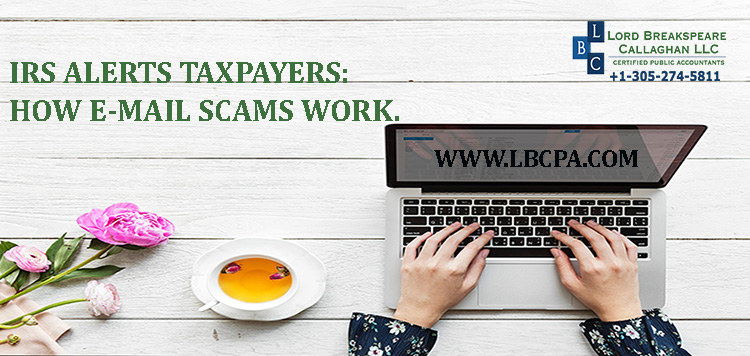LBCPA News 
Click here to go back
IRS ALERTS TAXPAYERS: HOW EMAIL SCAMS WORK.

Special serie Part 2
The agency warns that scammers continue to pose as the IRS, making threatening phone calls and using email phishing schemes to lure taxpayers. The scams may be particularly prevalent ahead of the Oct. 15 tax-filing extension deadline. Another tax scam, where criminals pose as charity organizations, tends to peak during hurricane season or following a natural disaster. Taxpayers should learn about these ongoing tax scams and know what to do if they’re targeted.
The IRS urges taxpayers to look out for suspicious calls, emails and donation requests and take appropriate action if they experience any of the following:
Phishing emails
How the scam works: Criminals send an email to your personal or business account(s) appearing to be from the IRS. The email usually features the IRS logo, uses agency language and asks taxpayers to provide sensitive information. It may also ask recipients to open an attachment or click on a link embedded within the email to supposedly give the taxpayer account access. In a more recent variation called “spear phishing,” the criminal, having done research on the victim ahead of time, will send an email posing as a trusted source. The email will make an urgent plea to click on a link and update an account immediately. The link will then direct the victim to what seems to be a trusted website but is in reality a phishing website controlled by the thief who can install malicious software.
What taxpayers should do: Do not provide personal information, click on links or open attachments from emails pretending to be from the IRS. Know that the IRS does not initiate contact by email or social media channels. The agency gets in touch with taxpayers through paper letters mailed by the U.S. Postal Service. IRS letters and notices are mailed to the taxpayer’s most recent address on file. Forward the email as-is, preferably with the full email headers to phishing@irs.gov. Delete the original email.
If you have any questions regarding accounting, domestic taxation, international taxation, IRS representation, U.S. tax implications of Real Estate transactions or financial statements, please give us a call at 305-274-5811.
Source: IRS






